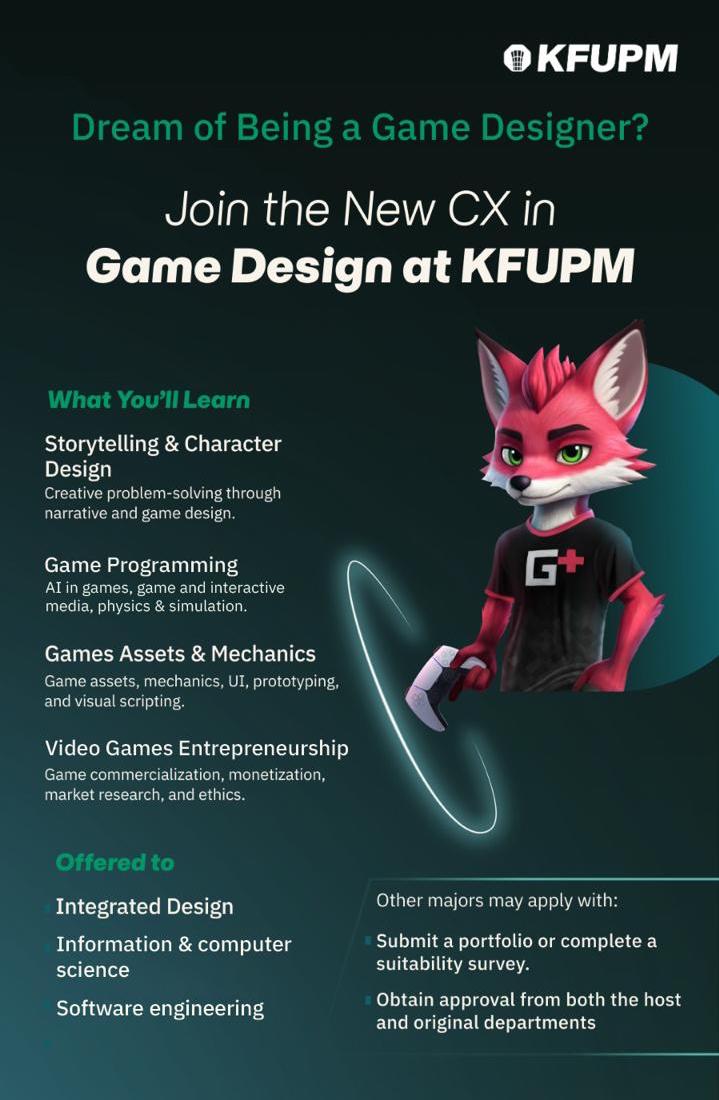Current Electives
ITD420 – Creative Thinking Techniques (for non-ITD students only)
Historical
and modern perspective of innovation and design. Creative and critical
design thinking techniques. Engineering-related problem–solving through
innovative and design methodologies. Design ideation processes and
principles, concept generation techniques, and design thinking.
Individual and group creativity projects and challenges. Ethical
considerations and responsibility of innovation.
ITD460 – Storytelling and Character DesignCreative ideation and problem-solving, storytelling, and narrative design in games and gamification. History of digital technologies in game design. Character design and development, features, rigging, and skeletons. 3D modeling techniques, clothing design, and sprite sheets. Hands-on 2D and 3D design projects using industry-standard software and applications. Game design documentation (GDD).
ITD461 – Games Assets and Mechanics
Design and development of assets in games. Game components, collectibles, and environment elements. Materials, mapping, UV maps, textures, and digital painting. Rendering, lighting, movement, and styles. Latest technologies and trends in-game mechanics and player interactions. User interface design, title screens, and menu design. Prototyping and gameplay testing. Visual Scripting using industry-standard game engines.
ITD490 – Special Topics in Integrated Design Solutions
In-depth exploration of a design specialization. Topics vary from one offering to another, including: Integrated Design (systems thinking and cross-disciplinary collaboration), Human-Centered Design (user research, prototyping, and usability testing), Graphic Design (visual communication principles, publication design, and graphics), Industrial and Product Design(design thinking, ergonomics, human factors and sustainable materials), non-digital game design (game mechanics, narrative, and user experience), Interactive Design (UI/UX and mobile/web applications design), and Human-Computer Interaction (accessibility and cognitive psychology in design).
ITD491 – Special Topics in Digital Integrated Design
In-depth exploration of essential digital design tools and techniques used across multiple design disciplines for PC and tablet-based applications. Topics vary from one offering to another, including 2D design and presentations, industrial and product design applications, 3D modeling, animation and motion graphics, interactive design, human-computer interaction (HCI) applications, mixed realities, and generative and visual AI.
ITD494 – Undergraduate Thesis (I)
This course is an independent research course for students undertaking the CX in undergraduate research. An undergraduate thesis is a substantive piece of research-oriented creative work demonstrating mastery over the discourse of one semester in a professional field. A thesis requires students to formulate the main hypothesis and research questions, maintain research integrity and be aware of research misconducts, and acquire skills of identifying research gaps in literature. Students will develop their scientific writing skills to report their preliminary research findings in a research proposal. Such proposal must be planned and completed under the supervision of a faculty (advisor) and, at the advisor’s discretion and department approval, may be reviewed by an additional co-advisor. Student will have to present to a committee his/her research plan and hypothesis in the thesis proposal.
ITD496 – Undergraduate Thesis (II)
This is an independent research course focused on making research contributions and presenting the results in a thesis for students undertaking the CX in undergraduate research. In this course, students will refine their thesis proposal in previous thesis course and work closely with the advisor to demonstrate their research findings over one semester in a professional field. This requires students to ensure the novelty and originality of the idea, conduct extensive research to validate the main hypothesis and research questions, and have the skills needed to write the thesis and prepare the research results for the proper venue for possible publication. Students will learn to develop their professional communication skills to defend their thesis in front of an independent scientific committee and possibly to deliver speech in a research symposium.
––––––––––––––––––––––––––––––––––––––––––––––––––––––––––––––––––––––––––––––––––––––––––––––––––––––––––
Current Concentrations

––––––––––––––––––––––––––––––––––––––––––––––––––––––––––––––––––––––––––––––––––––––––––––––––––––––––––
Future Concentrations
- Interactive Graphics and HCI
- Object Oriented / Product Design
- Human Centered Design
And many more to come in relation to design.